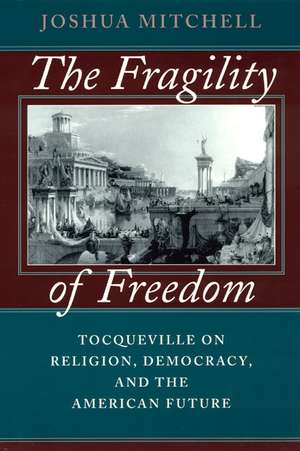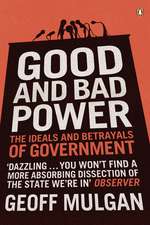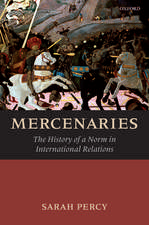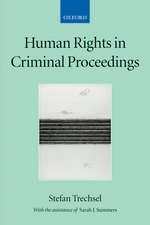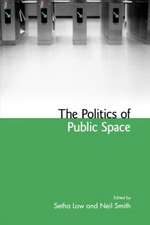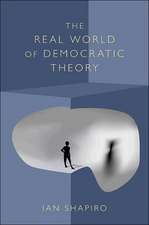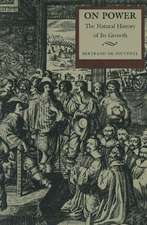The Fragility of Freedom: Tocqueville on Religion, Democracy, and the American Future
Autor Joshua Mitchellen Limba Engleză Paperback – 27 mai 1999
In this fresh interpretation of Tocqueville's thought, Joshua Mitchell explores the dynamic interplay between religion and politics in American democracy.
Focusing on Democracy in America, The Fragility of Freedom examines Tocqueville's key works and argues that his analysis of democracy is ultimately rooted in an Augustinian view of human psychology. As much a work of political philosophy as of religion, The Fragility of Freedom argues for the importance of a political theology that recognizes moderation.
"An intelligent and sharply drawn portrait of a conservative Toqueville."—Anne C. Rose, Journal of American History
"I recommend this book as one of a very few to approach seriously the sources of Tocqueville's intellectual and moral greatness."—Peter Augustine Lawler, Journal of Politics
"Mitchell ably places Democracy in America in the long conversation of Western political and theological thought."—Wilfred M. McClay, First Things
"Learned and thought-provoking."—Peter Berkowitz, New Republic
Focusing on Democracy in America, The Fragility of Freedom examines Tocqueville's key works and argues that his analysis of democracy is ultimately rooted in an Augustinian view of human psychology. As much a work of political philosophy as of religion, The Fragility of Freedom argues for the importance of a political theology that recognizes moderation.
"An intelligent and sharply drawn portrait of a conservative Toqueville."—Anne C. Rose, Journal of American History
"I recommend this book as one of a very few to approach seriously the sources of Tocqueville's intellectual and moral greatness."—Peter Augustine Lawler, Journal of Politics
"Mitchell ably places Democracy in America in the long conversation of Western political and theological thought."—Wilfred M. McClay, First Things
"Learned and thought-provoking."—Peter Berkowitz, New Republic
Preț: 275.03 lei
Nou
Puncte Express: 413
Preț estimativ în valută:
52.63€ • 54.37$ • 43.80£
52.63€ • 54.37$ • 43.80£
Carte tipărită la comandă
Livrare economică 25 martie-08 aprilie
Preluare comenzi: 021 569.72.76
Specificații
ISBN-13: 9780226532097
ISBN-10: 0226532097
Pagini: 288
Dimensiuni: 152 x 229 x 25 mm
Greutate: 0.4 kg
Ediția:1
Editura: University of Chicago Press
Colecția University of Chicago Press
ISBN-10: 0226532097
Pagini: 288
Dimensiuni: 152 x 229 x 25 mm
Greutate: 0.4 kg
Ediția:1
Editura: University of Chicago Press
Colecția University of Chicago Press
Notă biografică
Joshua Mitchell is associate professor of government at Georgetown University. He is the author of Not by Reason Alone: Religion, History, and Identity in Early Modern Political Thought, also available from the University of Chicago Press.
Cuprins
Preface
Chapter One
Introduction
1. The Augustinian Self
2. Antidotes to the Irrationalities of the Augustinian Self
3. Of the Embodiment and Disembodiment of Thought
4. Circularity of Cause and Effect
5. Of the Spillover Effects of One Sphere upon Another
6. Of Motion and Boundaries
7. Of New Beginnings and American Exceptionalism
Chapter Two
The Augustinian Self
1. Augustine and the Errancy from God
2. Hobbes and the Problem of Pride
3. Rousseau and the Errancy from Nature
4. Tocqueville and the Democratic Soul
5. The Enduring Power of the Augustinian Self: Nietzsche and the Democratic Age
Chapter Three
The Politics of Competition
1. The Purpose of Politics
2. Of Scale and Participation
3. The Interrelation of Political and Economic Participation
4. Of Associations
5. Of Newspapers: The Solution to the Problem of Site and Authority
6. Of Moderation and Motion: Mother Nature and Father Industriousness
7. When Boundaries Are Transgressed
8. Of Empire
Chapter Four
Christianity and Democracy
1. The Progress of History and Its Arrests: The Depth of Identity
2. The Problem of Difference in a Democracy
3. Christianity as Palliative for Envy and Difference
4. The Indirect Effects of Christianity upon Democracy
5. Of Long-Term Goals
6. The Right Relationship between Politics and Religion
7. The Permanence of Religion
Chapter Five
Conclusion
1. The New Political Science
2. Asking Too Much of Government, Asking Too Much of "the World"
3. What Is to Be Done?
4. Concluding Remarks
Bibliography
Chapter One
Introduction
1. The Augustinian Self
2. Antidotes to the Irrationalities of the Augustinian Self
3. Of the Embodiment and Disembodiment of Thought
4. Circularity of Cause and Effect
5. Of the Spillover Effects of One Sphere upon Another
6. Of Motion and Boundaries
7. Of New Beginnings and American Exceptionalism
Chapter Two
The Augustinian Self
1. Augustine and the Errancy from God
2. Hobbes and the Problem of Pride
3. Rousseau and the Errancy from Nature
4. Tocqueville and the Democratic Soul
5. The Enduring Power of the Augustinian Self: Nietzsche and the Democratic Age
Chapter Three
The Politics of Competition
1. The Purpose of Politics
2. Of Scale and Participation
3. The Interrelation of Political and Economic Participation
4. Of Associations
5. Of Newspapers: The Solution to the Problem of Site and Authority
6. Of Moderation and Motion: Mother Nature and Father Industriousness
7. When Boundaries Are Transgressed
8. Of Empire
Chapter Four
Christianity and Democracy
1. The Progress of History and Its Arrests: The Depth of Identity
2. The Problem of Difference in a Democracy
3. Christianity as Palliative for Envy and Difference
4. The Indirect Effects of Christianity upon Democracy
5. Of Long-Term Goals
6. The Right Relationship between Politics and Religion
7. The Permanence of Religion
Chapter Five
Conclusion
1. The New Political Science
2. Asking Too Much of Government, Asking Too Much of "the World"
3. What Is to Be Done?
4. Concluding Remarks
Bibliography
